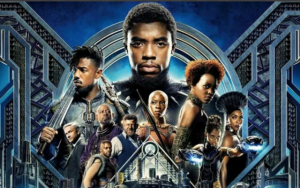Metro In Focus: Black Panther’s commentary on race and revolution.
 By Richard Crouse – Metro In Focus
By Richard Crouse – Metro In Focus
For those who complain that the recent spate of superhero movies aren’t about anything other than bombast and reaching into your wallet, I give you Black Panther. Directed by Ryan Coogler and starring Chadwick Boseman in the title role, it’s a movie that delivers wham-bam action but serves it up with compelling sides of mythology and social awareness.
“Part of my frustration that led me to write,” says playwright of the Tony Award-winning play Eclipsed and Black Panther star Danai Gurira, “was that I didn’t see stories that allowed truths to be told about the continent and about our potential and our power and our dimensionality and our perspective and our personality and our languages. What was really exciting to me was to see all of that embodied in what Wakanda and the Black Panther narrative bring with the African perspective. It is completely unprecedented.”
The film starts with a quick origin story, detailing the introduction of vibranium to the small (fictional) African nation of Wakanda. This mysterious metal is a wonder. Near indestructible, it can absorb kinetic energy and has imbued a Wakandan flower called the Heart-Shaped Herb with a supercharge that gives superpowers when ingested.
Cut to modern day. After his father’s death T’Challa (Boseman) is crowned king but just as he is ordained a rare Wakandan artifact made of vibranium is lifted from a London museum by two very bad men, Ulysses Klaue (Andy Serkis) and Erik “Killmonger” Stevens (Michael B. Jordan).
To retrieve the precious metal, T’Challa, a.k.a. Black Panther, along with spy Nakia (Lupita Nyong’o) and warrior Okoye (Gurira), travel to Korea where the artefact is about to be sold to CIA agent Everett K. Ross (Martin Freeman).
A wild battle leads to a power struggle that may not only compromise the throne of Wakanda but also threaten the safety of the world.
“I loved the idea of being able to enact a nation that was never colonized,” says Gurira, who also plays the katana-wielding Michonne on The Walking Dead. “I grew up in post-colonial Africa. There is a lot of work that goes into reclaiming who you are, how you define your place in the world and what your power potential truly is when you have been colonized.
“One thing that colonized people don’t have is that part of their history that tells them who they would have been had they never been colonized. The beauty of Wakanda is that is shows us something. It’s a celebration. So many things are pulled from actual stories and narratives. The costumes, the language are actually African. It is a celebration of a place that often gets distorted or misrepresented or presented as something deficient, which we all know, Africa is so not.”
Black Panther takes place in a couple of time frames (NO SPOILERS HERE!) but at its heart it is a timely story about social responsibility — a wealthy nation state must confront its role in the world — that pulsates with smart commentary about race and revolution. It takes a well-known comic book character, the first Black standalone superhero in the Marvel Universe, and delivers a movie ripe with subtext. Black Panther is not only capable of fighting the bad guys but is also a vessel for the film’s study of legacy and identity.
